Entrepreneurship: Ventures, Impact on Economy and SMEs Analysis
VerifiedAdded on 2023/01/19
|17
|4763
|32
Report
AI Summary
This report provides a comprehensive overview of entrepreneurship and small business management within the context of the UK economy. It begins with an executive summary highlighting the significant impact of small, medium, and micro enterprises (SMEs) on job creation and lifestyle enhancement. The introduction defines entrepreneurship, emphasizing its role in creating new businesses and fostering innovation. The report then delves into different types of entrepreneurial ventures, including large-scale, social, and lifestyle entrepreneurship, as well as micro, medium, and large enterprises, detailing their characteristics, contributions, and challenges. It compares and contrasts these ventures, highlighting their similarities and differences in terms of growth, management, and innovation. Furthermore, the report examines the impact of micro and small businesses on the UK economy, emphasizing their contribution to employment and GDP. The importance of SMEs in fostering economic growth and social development is also discussed, with an analysis of their role in poverty reduction, income generation, and national development. The report concludes by underscoring the vital role of SMEs in the UK economy and their impact on the living standards of the population.

Entrepreneurship and Small
Business Management
Business Management
Paraphrase This Document
Need a fresh take? Get an instant paraphrase of this document with our AI Paraphraser
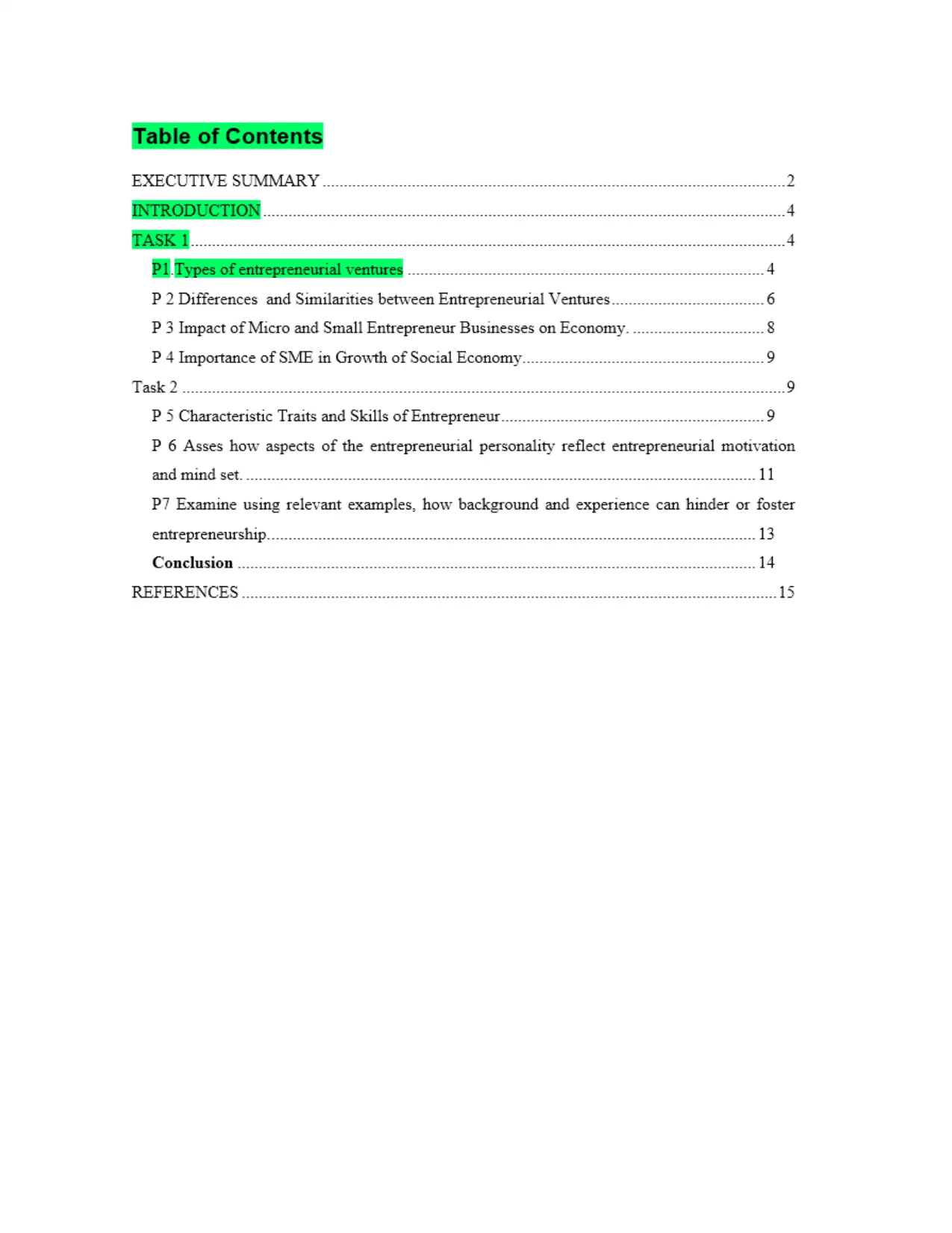

EXECUTIVE SUMMARY
Small, medium and micro enterprises have put huge impact on the UK economy. It has provided
job opportunities to people and also been engaged in enhancing the lifestyle of people living over
there. There are various skills and traits of entrepreneurs that has differentiated them from
business managers. Traits such as honesty and integrity, communication and decision making
have foster the growth of entrepreneurs.
Small, medium and micro enterprises have put huge impact on the UK economy. It has provided
job opportunities to people and also been engaged in enhancing the lifestyle of people living over
there. There are various skills and traits of entrepreneurs that has differentiated them from
business managers. Traits such as honesty and integrity, communication and decision making
have foster the growth of entrepreneurs.
⊘ This is a preview!⊘
Do you want full access?
Subscribe today to unlock all pages.

Trusted by 1+ million students worldwide
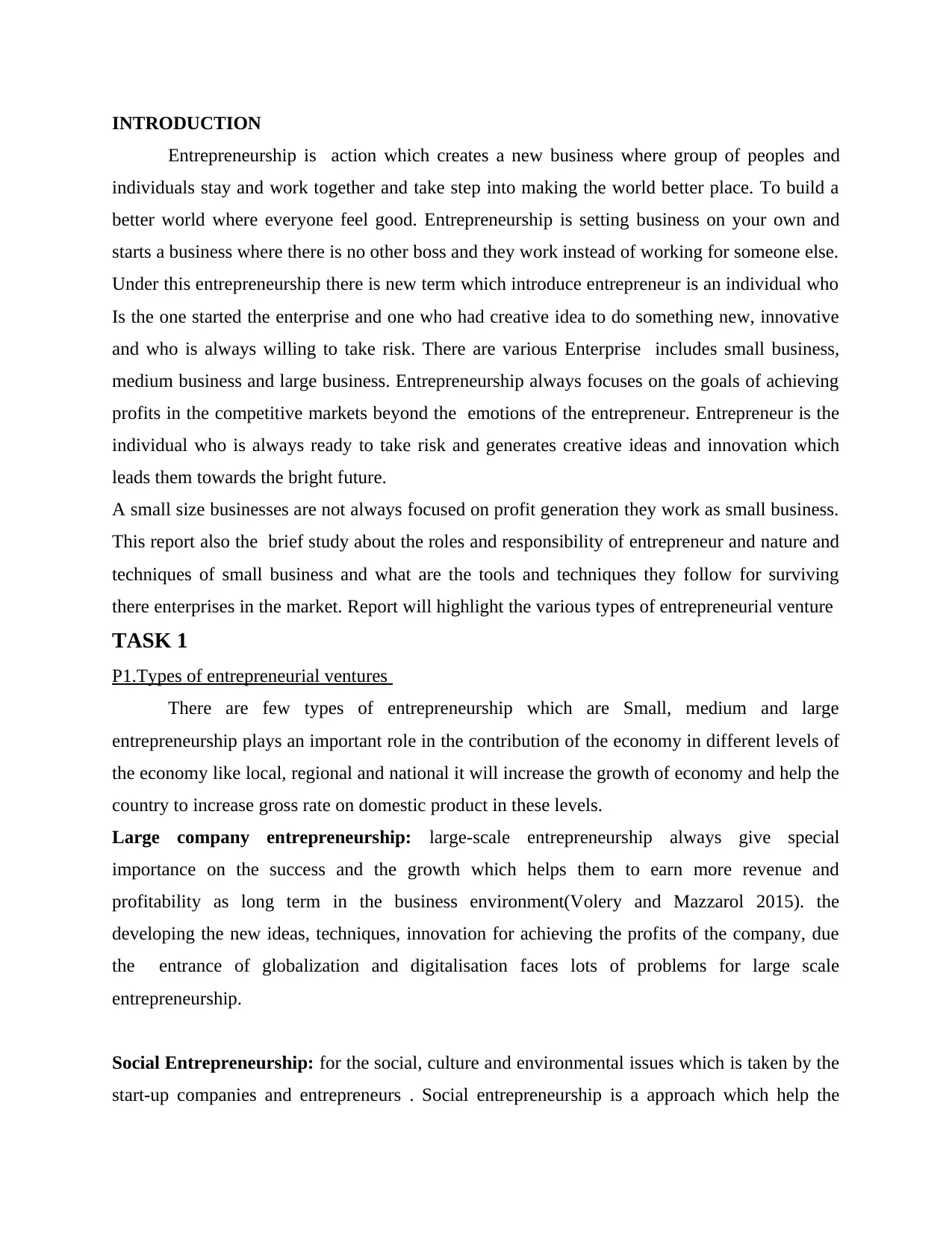
INTRODUCTION
Entrepreneurship is action which creates a new business where group of peoples and
individuals stay and work together and take step into making the world better place. To build a
better world where everyone feel good. Entrepreneurship is setting business on your own and
starts a business where there is no other boss and they work instead of working for someone else.
Under this entrepreneurship there is new term which introduce entrepreneur is an individual who
Is the one started the enterprise and one who had creative idea to do something new, innovative
and who is always willing to take risk. There are various Enterprise includes small business,
medium business and large business. Entrepreneurship always focuses on the goals of achieving
profits in the competitive markets beyond the emotions of the entrepreneur. Entrepreneur is the
individual who is always ready to take risk and generates creative ideas and innovation which
leads them towards the bright future.
A small size businesses are not always focused on profit generation they work as small business.
This report also the brief study about the roles and responsibility of entrepreneur and nature and
techniques of small business and what are the tools and techniques they follow for surviving
there enterprises in the market. Report will highlight the various types of entrepreneurial venture
TASK 1
P1.Types of entrepreneurial ventures
There are few types of entrepreneurship which are Small, medium and large
entrepreneurship plays an important role in the contribution of the economy in different levels of
the economy like local, regional and national it will increase the growth of economy and help the
country to increase gross rate on domestic product in these levels.
Large company entrepreneurship: large-scale entrepreneurship always give special
importance on the success and the growth which helps them to earn more revenue and
profitability as long term in the business environment(Volery and Mazzarol 2015). the
developing the new ideas, techniques, innovation for achieving the profits of the company, due
the entrance of globalization and digitalisation faces lots of problems for large scale
entrepreneurship.
Social Entrepreneurship: for the social, culture and environmental issues which is taken by the
start-up companies and entrepreneurs . Social entrepreneurship is a approach which help the
Entrepreneurship is action which creates a new business where group of peoples and
individuals stay and work together and take step into making the world better place. To build a
better world where everyone feel good. Entrepreneurship is setting business on your own and
starts a business where there is no other boss and they work instead of working for someone else.
Under this entrepreneurship there is new term which introduce entrepreneur is an individual who
Is the one started the enterprise and one who had creative idea to do something new, innovative
and who is always willing to take risk. There are various Enterprise includes small business,
medium business and large business. Entrepreneurship always focuses on the goals of achieving
profits in the competitive markets beyond the emotions of the entrepreneur. Entrepreneur is the
individual who is always ready to take risk and generates creative ideas and innovation which
leads them towards the bright future.
A small size businesses are not always focused on profit generation they work as small business.
This report also the brief study about the roles and responsibility of entrepreneur and nature and
techniques of small business and what are the tools and techniques they follow for surviving
there enterprises in the market. Report will highlight the various types of entrepreneurial venture
TASK 1
P1.Types of entrepreneurial ventures
There are few types of entrepreneurship which are Small, medium and large
entrepreneurship plays an important role in the contribution of the economy in different levels of
the economy like local, regional and national it will increase the growth of economy and help the
country to increase gross rate on domestic product in these levels.
Large company entrepreneurship: large-scale entrepreneurship always give special
importance on the success and the growth which helps them to earn more revenue and
profitability as long term in the business environment(Volery and Mazzarol 2015). the
developing the new ideas, techniques, innovation for achieving the profits of the company, due
the entrance of globalization and digitalisation faces lots of problems for large scale
entrepreneurship.
Social Entrepreneurship: for the social, culture and environmental issues which is taken by the
start-up companies and entrepreneurs . Social entrepreneurship is a approach which help the
Paraphrase This Document
Need a fresh take? Get an instant paraphrase of this document with our AI Paraphraser
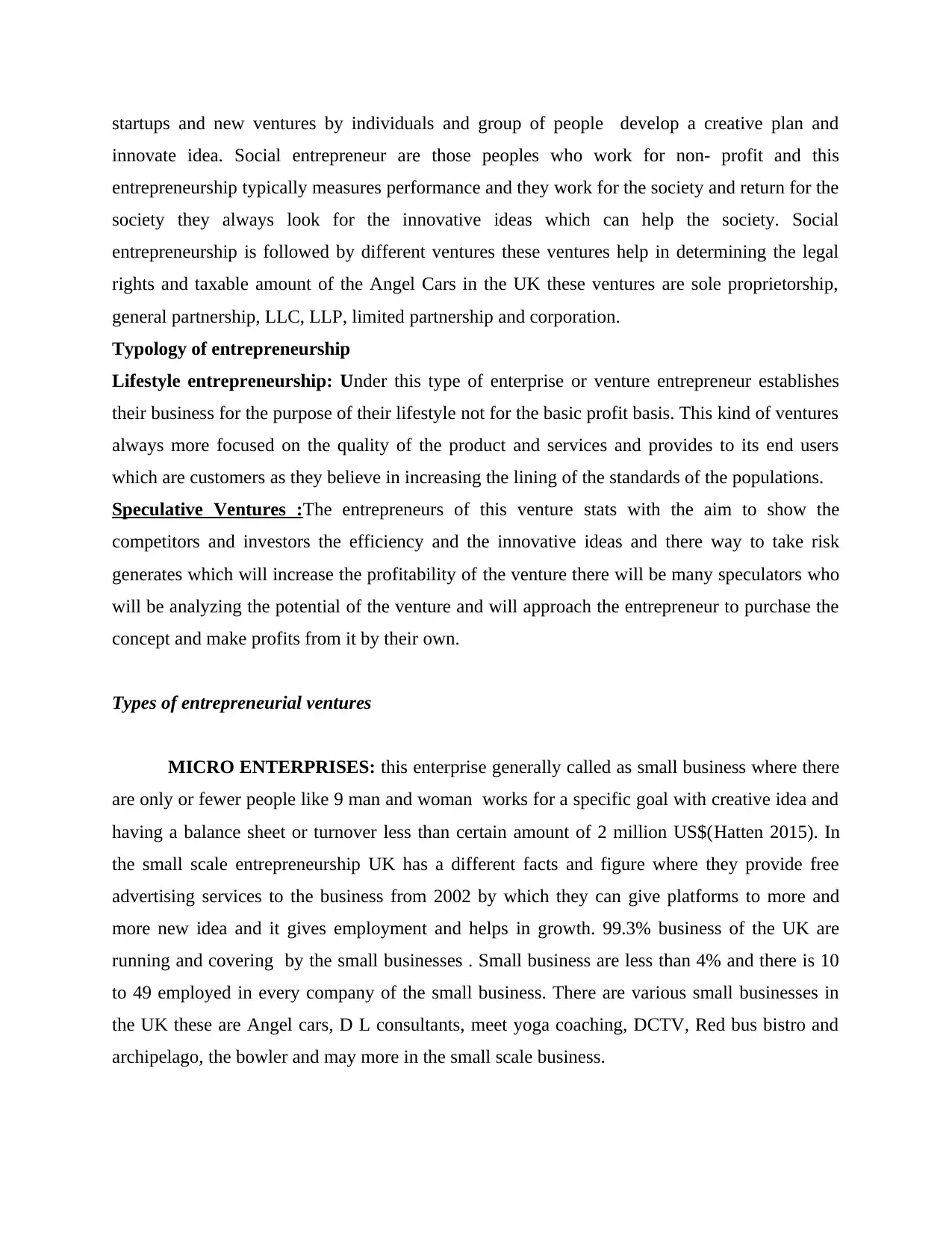
startups and new ventures by individuals and group of people develop a creative plan and
innovate idea. Social entrepreneur are those peoples who work for non- profit and this
entrepreneurship typically measures performance and they work for the society and return for the
society they always look for the innovative ideas which can help the society. Social
entrepreneurship is followed by different ventures these ventures help in determining the legal
rights and taxable amount of the Angel Cars in the UK these ventures are sole proprietorship,
general partnership, LLC, LLP, limited partnership and corporation.
Typology of entrepreneurship
Lifestyle entrepreneurship: Under this type of enterprise or venture entrepreneur establishes
their business for the purpose of their lifestyle not for the basic profit basis. This kind of ventures
always more focused on the quality of the product and services and provides to its end users
which are customers as they believe in increasing the lining of the standards of the populations.
Speculative Ventures :The entrepreneurs of this venture stats with the aim to show the
competitors and investors the efficiency and the innovative ideas and there way to take risk
generates which will increase the profitability of the venture there will be many speculators who
will be analyzing the potential of the venture and will approach the entrepreneur to purchase the
concept and make profits from it by their own.
Types of entrepreneurial ventures
MICRO ENTERPRISES: this enterprise generally called as small business where there
are only or fewer people like 9 man and woman works for a specific goal with creative idea and
having a balance sheet or turnover less than certain amount of 2 million US$(Hatten 2015). In
the small scale entrepreneurship UK has a different facts and figure where they provide free
advertising services to the business from 2002 by which they can give platforms to more and
more new idea and it gives employment and helps in growth. 99.3% business of the UK are
running and covering by the small businesses . Small business are less than 4% and there is 10
to 49 employed in every company of the small business. There are various small businesses in
the UK these are Angel cars, D L consultants, meet yoga coaching, DCTV, Red bus bistro and
archipelago, the bowler and may more in the small scale business.
innovate idea. Social entrepreneur are those peoples who work for non- profit and this
entrepreneurship typically measures performance and they work for the society and return for the
society they always look for the innovative ideas which can help the society. Social
entrepreneurship is followed by different ventures these ventures help in determining the legal
rights and taxable amount of the Angel Cars in the UK these ventures are sole proprietorship,
general partnership, LLC, LLP, limited partnership and corporation.
Typology of entrepreneurship
Lifestyle entrepreneurship: Under this type of enterprise or venture entrepreneur establishes
their business for the purpose of their lifestyle not for the basic profit basis. This kind of ventures
always more focused on the quality of the product and services and provides to its end users
which are customers as they believe in increasing the lining of the standards of the populations.
Speculative Ventures :The entrepreneurs of this venture stats with the aim to show the
competitors and investors the efficiency and the innovative ideas and there way to take risk
generates which will increase the profitability of the venture there will be many speculators who
will be analyzing the potential of the venture and will approach the entrepreneur to purchase the
concept and make profits from it by their own.
Types of entrepreneurial ventures
MICRO ENTERPRISES: this enterprise generally called as small business where there
are only or fewer people like 9 man and woman works for a specific goal with creative idea and
having a balance sheet or turnover less than certain amount of 2 million US$(Hatten 2015). In
the small scale entrepreneurship UK has a different facts and figure where they provide free
advertising services to the business from 2002 by which they can give platforms to more and
more new idea and it gives employment and helps in growth. 99.3% business of the UK are
running and covering by the small businesses . Small business are less than 4% and there is 10
to 49 employed in every company of the small business. There are various small businesses in
the UK these are Angel cars, D L consultants, meet yoga coaching, DCTV, Red bus bistro and
archipelago, the bowler and may more in the small scale business.
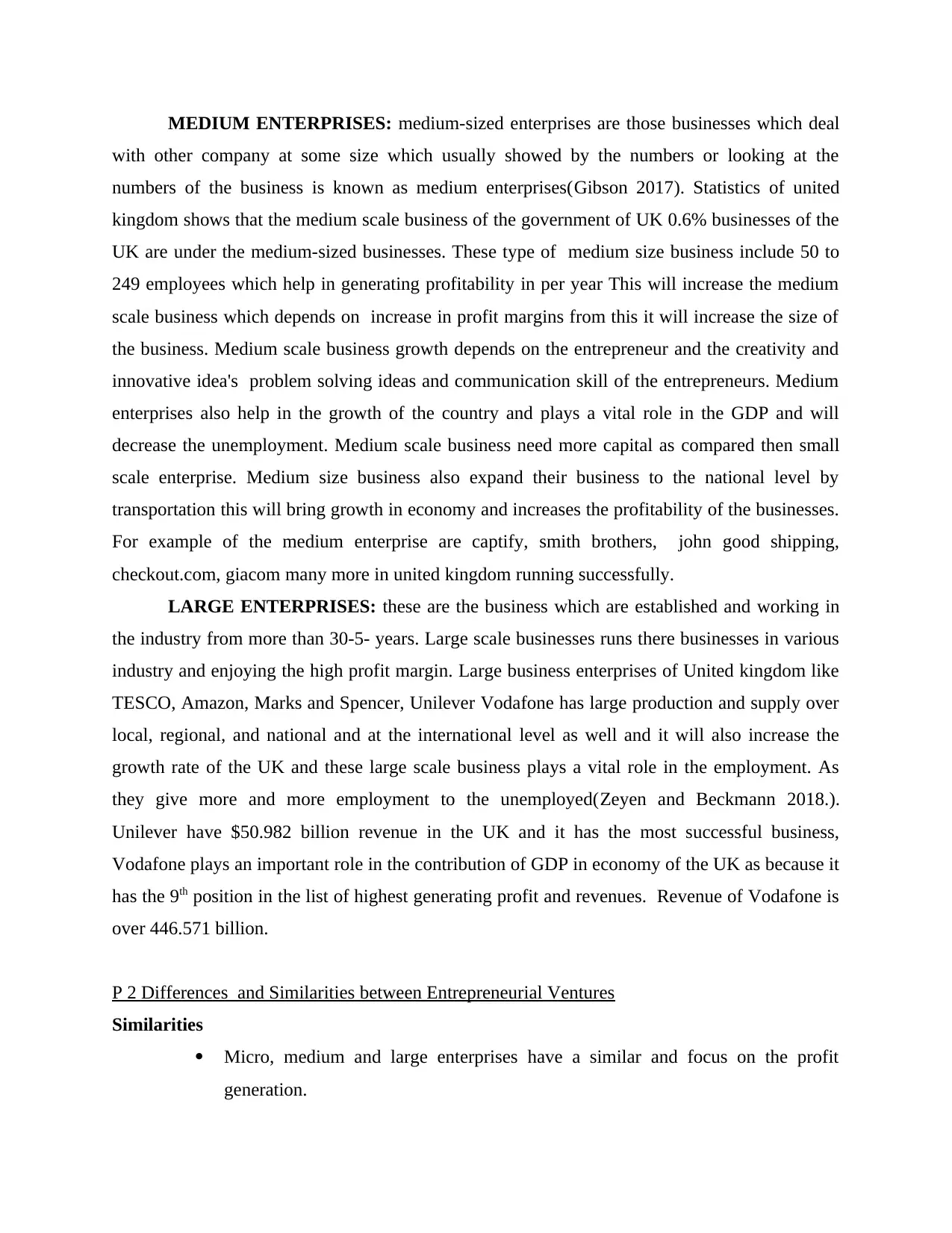
MEDIUM ENTERPRISES: medium-sized enterprises are those businesses which deal
with other company at some size which usually showed by the numbers or looking at the
numbers of the business is known as medium enterprises(Gibson 2017). Statistics of united
kingdom shows that the medium scale business of the government of UK 0.6% businesses of the
UK are under the medium-sized businesses. These type of medium size business include 50 to
249 employees which help in generating profitability in per year This will increase the medium
scale business which depends on increase in profit margins from this it will increase the size of
the business. Medium scale business growth depends on the entrepreneur and the creativity and
innovative idea's problem solving ideas and communication skill of the entrepreneurs. Medium
enterprises also help in the growth of the country and plays a vital role in the GDP and will
decrease the unemployment. Medium scale business need more capital as compared then small
scale enterprise. Medium size business also expand their business to the national level by
transportation this will bring growth in economy and increases the profitability of the businesses.
For example of the medium enterprise are captify, smith brothers, john good shipping,
checkout.com, giacom many more in united kingdom running successfully.
LARGE ENTERPRISES: these are the business which are established and working in
the industry from more than 30-5- years. Large scale businesses runs there businesses in various
industry and enjoying the high profit margin. Large business enterprises of United kingdom like
TESCO, Amazon, Marks and Spencer, Unilever Vodafone has large production and supply over
local, regional, and national and at the international level as well and it will also increase the
growth rate of the UK and these large scale business plays a vital role in the employment. As
they give more and more employment to the unemployed(Zeyen and Beckmann 2018.).
Unilever have $50.982 billion revenue in the UK and it has the most successful business,
Vodafone plays an important role in the contribution of GDP in economy of the UK as because it
has the 9th position in the list of highest generating profit and revenues. Revenue of Vodafone is
over 446.571 billion.
P 2 Differences and Similarities between Entrepreneurial Ventures
Similarities
Micro, medium and large enterprises have a similar and focus on the profit
generation.
with other company at some size which usually showed by the numbers or looking at the
numbers of the business is known as medium enterprises(Gibson 2017). Statistics of united
kingdom shows that the medium scale business of the government of UK 0.6% businesses of the
UK are under the medium-sized businesses. These type of medium size business include 50 to
249 employees which help in generating profitability in per year This will increase the medium
scale business which depends on increase in profit margins from this it will increase the size of
the business. Medium scale business growth depends on the entrepreneur and the creativity and
innovative idea's problem solving ideas and communication skill of the entrepreneurs. Medium
enterprises also help in the growth of the country and plays a vital role in the GDP and will
decrease the unemployment. Medium scale business need more capital as compared then small
scale enterprise. Medium size business also expand their business to the national level by
transportation this will bring growth in economy and increases the profitability of the businesses.
For example of the medium enterprise are captify, smith brothers, john good shipping,
checkout.com, giacom many more in united kingdom running successfully.
LARGE ENTERPRISES: these are the business which are established and working in
the industry from more than 30-5- years. Large scale businesses runs there businesses in various
industry and enjoying the high profit margin. Large business enterprises of United kingdom like
TESCO, Amazon, Marks and Spencer, Unilever Vodafone has large production and supply over
local, regional, and national and at the international level as well and it will also increase the
growth rate of the UK and these large scale business plays a vital role in the employment. As
they give more and more employment to the unemployed(Zeyen and Beckmann 2018.).
Unilever have $50.982 billion revenue in the UK and it has the most successful business,
Vodafone plays an important role in the contribution of GDP in economy of the UK as because it
has the 9th position in the list of highest generating profit and revenues. Revenue of Vodafone is
over 446.571 billion.
P 2 Differences and Similarities between Entrepreneurial Ventures
Similarities
Micro, medium and large enterprises have a similar and focus on the profit
generation.
⊘ This is a preview!⊘
Do you want full access?
Subscribe today to unlock all pages.

Trusted by 1+ million students worldwide
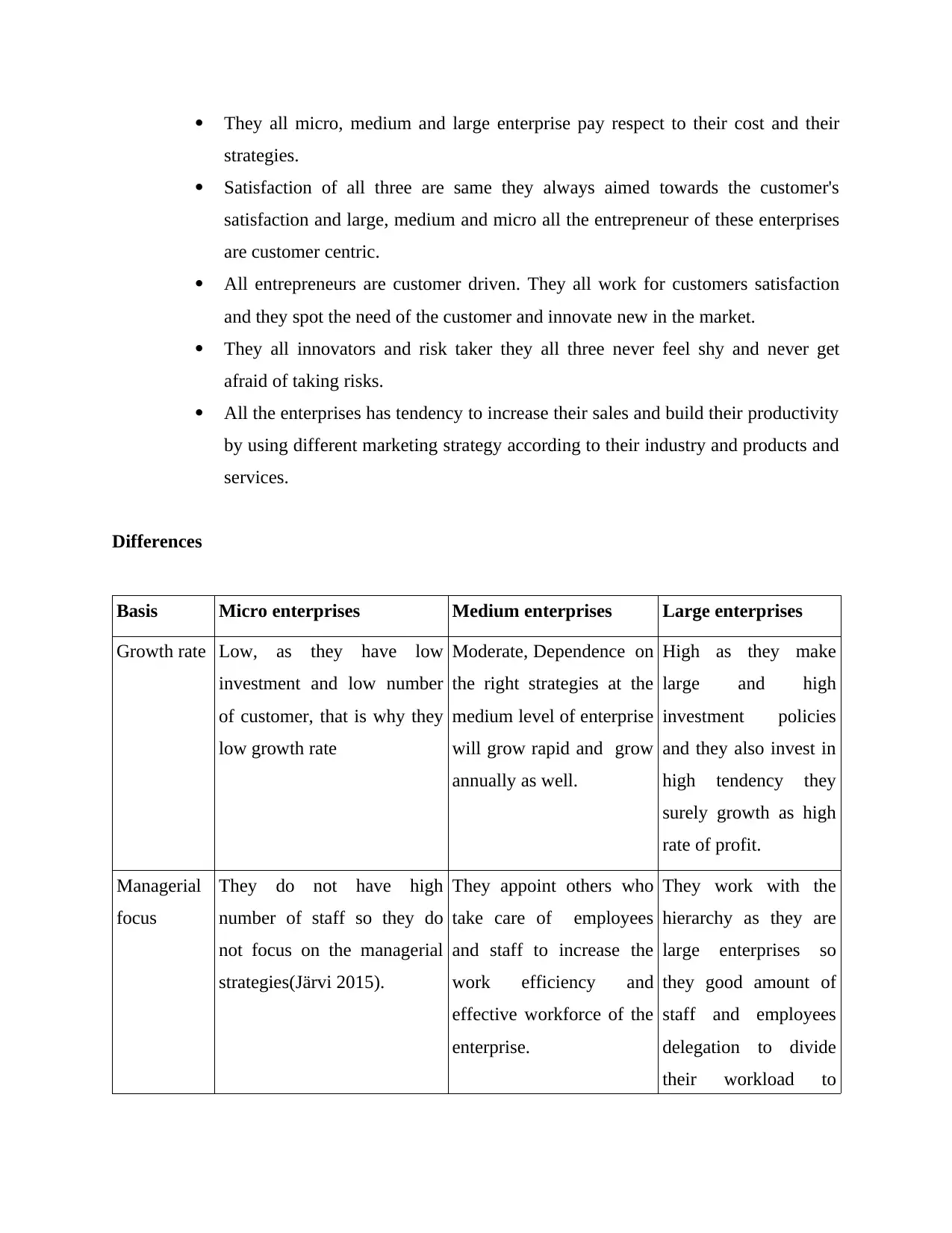
They all micro, medium and large enterprise pay respect to their cost and their
strategies.
Satisfaction of all three are same they always aimed towards the customer's
satisfaction and large, medium and micro all the entrepreneur of these enterprises
are customer centric.
All entrepreneurs are customer driven. They all work for customers satisfaction
and they spot the need of the customer and innovate new in the market.
They all innovators and risk taker they all three never feel shy and never get
afraid of taking risks.
All the enterprises has tendency to increase their sales and build their productivity
by using different marketing strategy according to their industry and products and
services.
Differences
Basis Micro enterprises Medium enterprises Large enterprises
Growth rate Low, as they have low
investment and low number
of customer, that is why they
low growth rate
Moderate, Dependence on
the right strategies at the
medium level of enterprise
will grow rapid and grow
annually as well.
High as they make
large and high
investment policies
and they also invest in
high tendency they
surely growth as high
rate of profit.
Managerial
focus
They do not have high
number of staff so they do
not focus on the managerial
strategies(Järvi 2015).
They appoint others who
take care of employees
and staff to increase the
work efficiency and
effective workforce of the
enterprise.
They work with the
hierarchy as they are
large enterprises so
they good amount of
staff and employees
delegation to divide
their workload to
strategies.
Satisfaction of all three are same they always aimed towards the customer's
satisfaction and large, medium and micro all the entrepreneur of these enterprises
are customer centric.
All entrepreneurs are customer driven. They all work for customers satisfaction
and they spot the need of the customer and innovate new in the market.
They all innovators and risk taker they all three never feel shy and never get
afraid of taking risks.
All the enterprises has tendency to increase their sales and build their productivity
by using different marketing strategy according to their industry and products and
services.
Differences
Basis Micro enterprises Medium enterprises Large enterprises
Growth rate Low, as they have low
investment and low number
of customer, that is why they
low growth rate
Moderate, Dependence on
the right strategies at the
medium level of enterprise
will grow rapid and grow
annually as well.
High as they make
large and high
investment policies
and they also invest in
high tendency they
surely growth as high
rate of profit.
Managerial
focus
They do not have high
number of staff so they do
not focus on the managerial
strategies(Järvi 2015).
They appoint others who
take care of employees
and staff to increase the
work efficiency and
effective workforce of the
enterprise.
They work with the
hierarchy as they are
large enterprises so
they good amount of
staff and employees
delegation to divide
their workload to
Paraphrase This Document
Need a fresh take? Get an instant paraphrase of this document with our AI Paraphraser
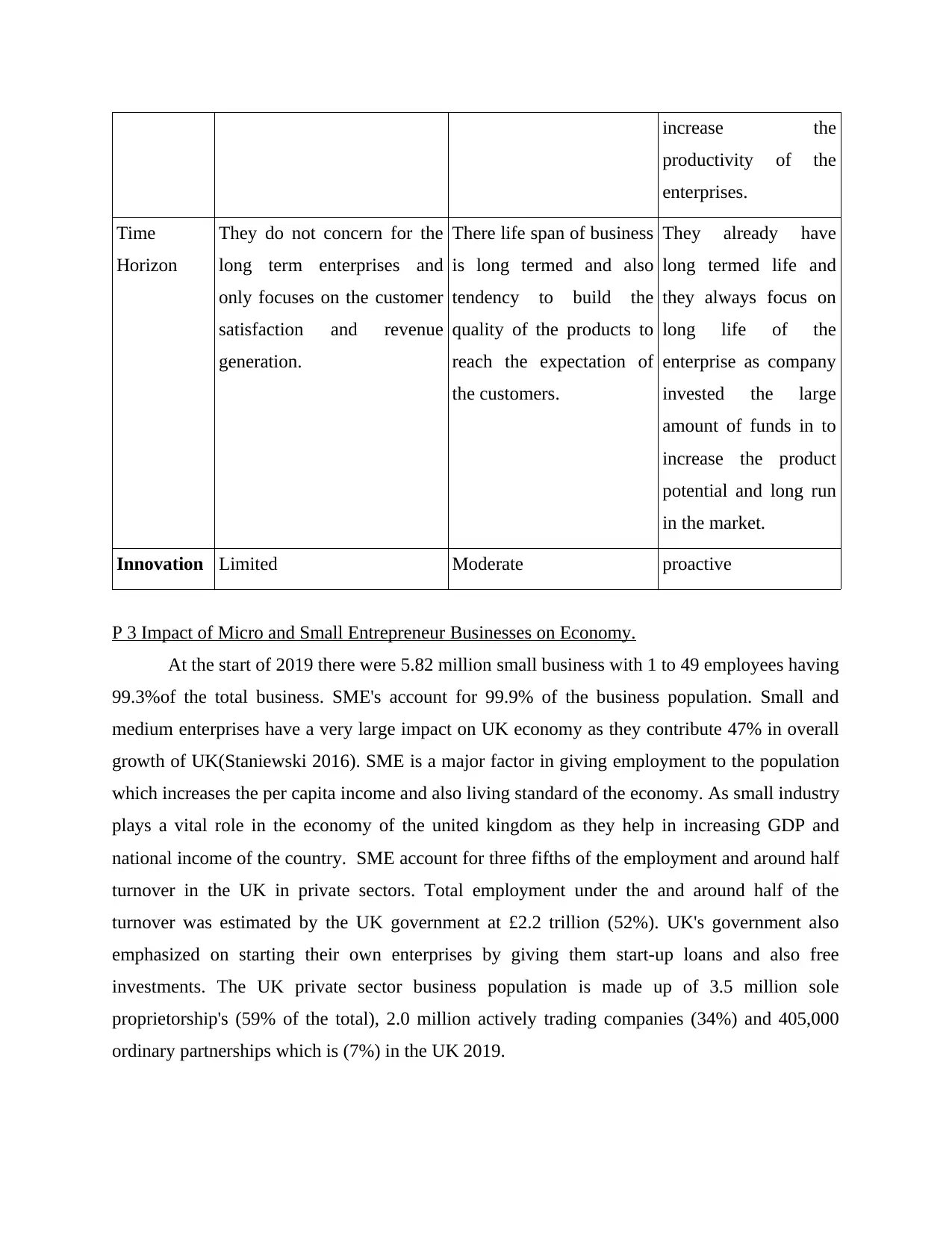
increase the
productivity of the
enterprises.
Time
Horizon
They do not concern for the
long term enterprises and
only focuses on the customer
satisfaction and revenue
generation.
There life span of business
is long termed and also
tendency to build the
quality of the products to
reach the expectation of
the customers.
They already have
long termed life and
they always focus on
long life of the
enterprise as company
invested the large
amount of funds in to
increase the product
potential and long run
in the market.
Innovation Limited Moderate proactive
P 3 Impact of Micro and Small Entrepreneur Businesses on Economy.
At the start of 2019 there were 5.82 million small business with 1 to 49 employees having
99.3%of the total business. SME's account for 99.9% of the business population. Small and
medium enterprises have a very large impact on UK economy as they contribute 47% in overall
growth of UK(Staniewski 2016). SME is a major factor in giving employment to the population
which increases the per capita income and also living standard of the economy. As small industry
plays a vital role in the economy of the united kingdom as they help in increasing GDP and
national income of the country. SME account for three fifths of the employment and around half
turnover in the UK in private sectors. Total employment under the and around half of the
turnover was estimated by the UK government at £2.2 trillion (52%). UK's government also
emphasized on starting their own enterprises by giving them start-up loans and also free
investments. The UK private sector business population is made up of 3.5 million sole
proprietorship's (59% of the total), 2.0 million actively trading companies (34%) and 405,000
ordinary partnerships which is (7%) in the UK 2019.
productivity of the
enterprises.
Time
Horizon
They do not concern for the
long term enterprises and
only focuses on the customer
satisfaction and revenue
generation.
There life span of business
is long termed and also
tendency to build the
quality of the products to
reach the expectation of
the customers.
They already have
long termed life and
they always focus on
long life of the
enterprise as company
invested the large
amount of funds in to
increase the product
potential and long run
in the market.
Innovation Limited Moderate proactive
P 3 Impact of Micro and Small Entrepreneur Businesses on Economy.
At the start of 2019 there were 5.82 million small business with 1 to 49 employees having
99.3%of the total business. SME's account for 99.9% of the business population. Small and
medium enterprises have a very large impact on UK economy as they contribute 47% in overall
growth of UK(Staniewski 2016). SME is a major factor in giving employment to the population
which increases the per capita income and also living standard of the economy. As small industry
plays a vital role in the economy of the united kingdom as they help in increasing GDP and
national income of the country. SME account for three fifths of the employment and around half
turnover in the UK in private sectors. Total employment under the and around half of the
turnover was estimated by the UK government at £2.2 trillion (52%). UK's government also
emphasized on starting their own enterprises by giving them start-up loans and also free
investments. The UK private sector business population is made up of 3.5 million sole
proprietorship's (59% of the total), 2.0 million actively trading companies (34%) and 405,000
ordinary partnerships which is (7%) in the UK 2019.
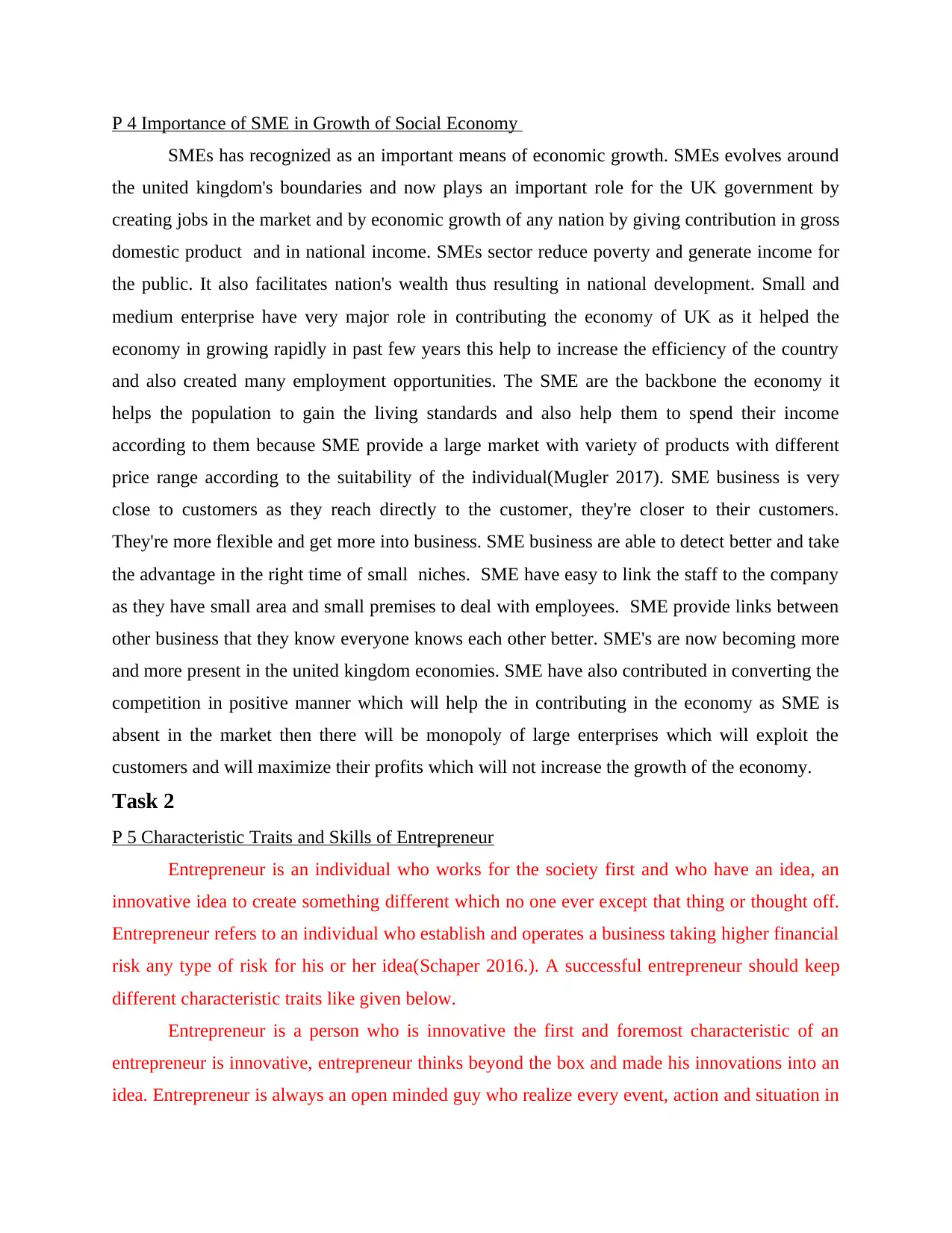
P 4 Importance of SME in Growth of Social Economy
SMEs has recognized as an important means of economic growth. SMEs evolves around
the united kingdom's boundaries and now plays an important role for the UK government by
creating jobs in the market and by economic growth of any nation by giving contribution in gross
domestic product and in national income. SMEs sector reduce poverty and generate income for
the public. It also facilitates nation's wealth thus resulting in national development. Small and
medium enterprise have very major role in contributing the economy of UK as it helped the
economy in growing rapidly in past few years this help to increase the efficiency of the country
and also created many employment opportunities. The SME are the backbone the economy it
helps the population to gain the living standards and also help them to spend their income
according to them because SME provide a large market with variety of products with different
price range according to the suitability of the individual(Mugler 2017). SME business is very
close to customers as they reach directly to the customer, they're closer to their customers.
They're more flexible and get more into business. SME business are able to detect better and take
the advantage in the right time of small niches. SME have easy to link the staff to the company
as they have small area and small premises to deal with employees. SME provide links between
other business that they know everyone knows each other better. SME's are now becoming more
and more present in the united kingdom economies. SME have also contributed in converting the
competition in positive manner which will help the in contributing in the economy as SME is
absent in the market then there will be monopoly of large enterprises which will exploit the
customers and will maximize their profits which will not increase the growth of the economy.
Task 2
P 5 Characteristic Traits and Skills of Entrepreneur
Entrepreneur is an individual who works for the society first and who have an idea, an
innovative idea to create something different which no one ever except that thing or thought off.
Entrepreneur refers to an individual who establish and operates a business taking higher financial
risk any type of risk for his or her idea(Schaper 2016.). A successful entrepreneur should keep
different characteristic traits like given below.
Entrepreneur is a person who is innovative the first and foremost characteristic of an
entrepreneur is innovative, entrepreneur thinks beyond the box and made his innovations into an
idea. Entrepreneur is always an open minded guy who realize every event, action and situation in
SMEs has recognized as an important means of economic growth. SMEs evolves around
the united kingdom's boundaries and now plays an important role for the UK government by
creating jobs in the market and by economic growth of any nation by giving contribution in gross
domestic product and in national income. SMEs sector reduce poverty and generate income for
the public. It also facilitates nation's wealth thus resulting in national development. Small and
medium enterprise have very major role in contributing the economy of UK as it helped the
economy in growing rapidly in past few years this help to increase the efficiency of the country
and also created many employment opportunities. The SME are the backbone the economy it
helps the population to gain the living standards and also help them to spend their income
according to them because SME provide a large market with variety of products with different
price range according to the suitability of the individual(Mugler 2017). SME business is very
close to customers as they reach directly to the customer, they're closer to their customers.
They're more flexible and get more into business. SME business are able to detect better and take
the advantage in the right time of small niches. SME have easy to link the staff to the company
as they have small area and small premises to deal with employees. SME provide links between
other business that they know everyone knows each other better. SME's are now becoming more
and more present in the united kingdom economies. SME have also contributed in converting the
competition in positive manner which will help the in contributing in the economy as SME is
absent in the market then there will be monopoly of large enterprises which will exploit the
customers and will maximize their profits which will not increase the growth of the economy.
Task 2
P 5 Characteristic Traits and Skills of Entrepreneur
Entrepreneur is an individual who works for the society first and who have an idea, an
innovative idea to create something different which no one ever except that thing or thought off.
Entrepreneur refers to an individual who establish and operates a business taking higher financial
risk any type of risk for his or her idea(Schaper 2016.). A successful entrepreneur should keep
different characteristic traits like given below.
Entrepreneur is a person who is innovative the first and foremost characteristic of an
entrepreneur is innovative, entrepreneur thinks beyond the box and made his innovations into an
idea. Entrepreneur is always an open minded guy who realize every event, action and situation in
⊘ This is a preview!⊘
Do you want full access?
Subscribe today to unlock all pages.

Trusted by 1+ million students worldwide
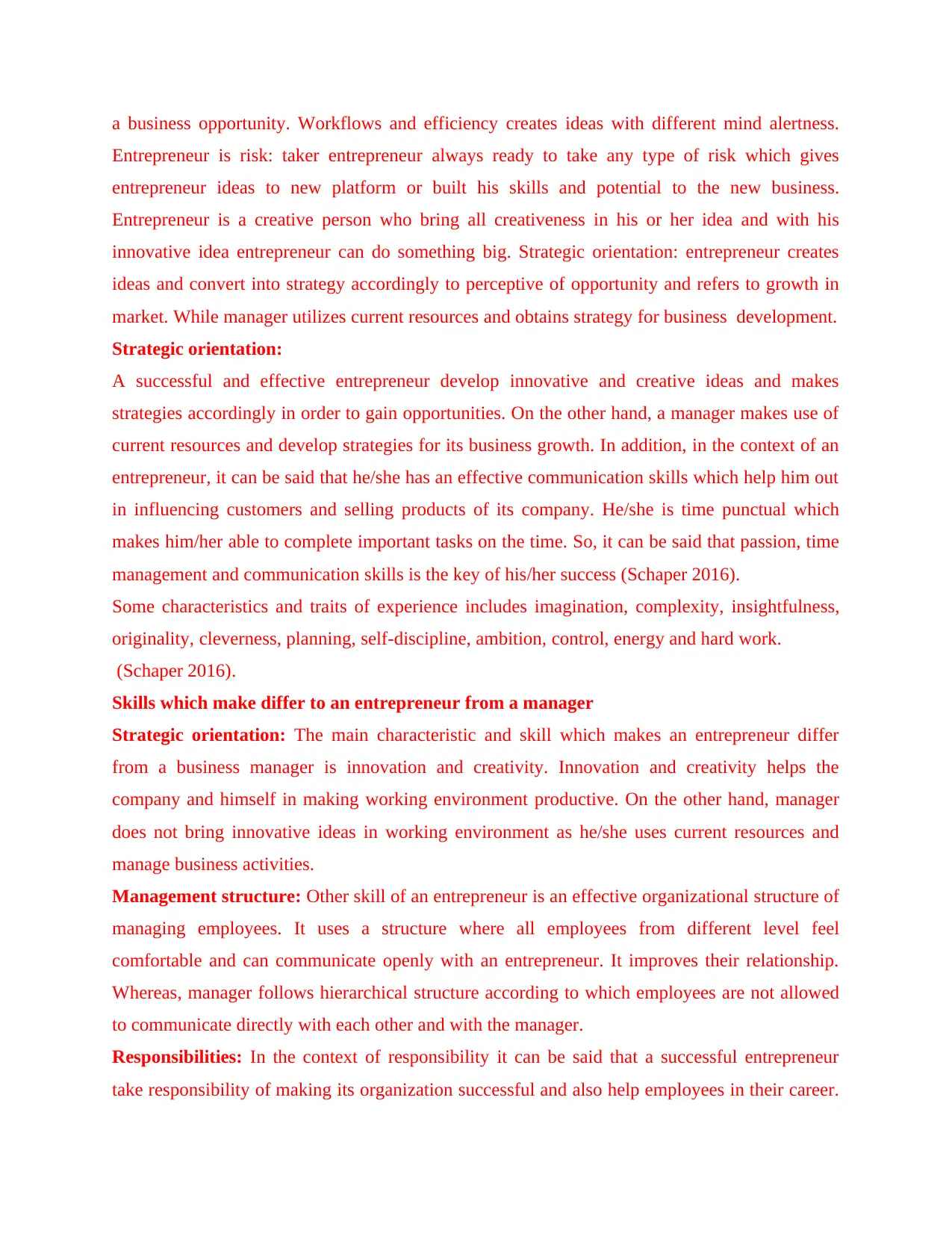
a business opportunity. Workflows and efficiency creates ideas with different mind alertness.
Entrepreneur is risk: taker entrepreneur always ready to take any type of risk which gives
entrepreneur ideas to new platform or built his skills and potential to the new business.
Entrepreneur is a creative person who bring all creativeness in his or her idea and with his
innovative idea entrepreneur can do something big. Strategic orientation: entrepreneur creates
ideas and convert into strategy accordingly to perceptive of opportunity and refers to growth in
market. While manager utilizes current resources and obtains strategy for business development.
Strategic orientation:
A successful and effective entrepreneur develop innovative and creative ideas and makes
strategies accordingly in order to gain opportunities. On the other hand, a manager makes use of
current resources and develop strategies for its business growth. In addition, in the context of an
entrepreneur, it can be said that he/she has an effective communication skills which help him out
in influencing customers and selling products of its company. He/she is time punctual which
makes him/her able to complete important tasks on the time. So, it can be said that passion, time
management and communication skills is the key of his/her success (Schaper 2016).
Some characteristics and traits of experience includes imagination, complexity, insightfulness,
originality, cleverness, planning, self-discipline, ambition, control, energy and hard work.
(Schaper 2016).
Skills which make differ to an entrepreneur from a manager
Strategic orientation: The main characteristic and skill which makes an entrepreneur differ
from a business manager is innovation and creativity. Innovation and creativity helps the
company and himself in making working environment productive. On the other hand, manager
does not bring innovative ideas in working environment as he/she uses current resources and
manage business activities.
Management structure: Other skill of an entrepreneur is an effective organizational structure of
managing employees. It uses a structure where all employees from different level feel
comfortable and can communicate openly with an entrepreneur. It improves their relationship.
Whereas, manager follows hierarchical structure according to which employees are not allowed
to communicate directly with each other and with the manager.
Responsibilities: In the context of responsibility it can be said that a successful entrepreneur
take responsibility of making its organization successful and also help employees in their career.
Entrepreneur is risk: taker entrepreneur always ready to take any type of risk which gives
entrepreneur ideas to new platform or built his skills and potential to the new business.
Entrepreneur is a creative person who bring all creativeness in his or her idea and with his
innovative idea entrepreneur can do something big. Strategic orientation: entrepreneur creates
ideas and convert into strategy accordingly to perceptive of opportunity and refers to growth in
market. While manager utilizes current resources and obtains strategy for business development.
Strategic orientation:
A successful and effective entrepreneur develop innovative and creative ideas and makes
strategies accordingly in order to gain opportunities. On the other hand, a manager makes use of
current resources and develop strategies for its business growth. In addition, in the context of an
entrepreneur, it can be said that he/she has an effective communication skills which help him out
in influencing customers and selling products of its company. He/she is time punctual which
makes him/her able to complete important tasks on the time. So, it can be said that passion, time
management and communication skills is the key of his/her success (Schaper 2016).
Some characteristics and traits of experience includes imagination, complexity, insightfulness,
originality, cleverness, planning, self-discipline, ambition, control, energy and hard work.
(Schaper 2016).
Skills which make differ to an entrepreneur from a manager
Strategic orientation: The main characteristic and skill which makes an entrepreneur differ
from a business manager is innovation and creativity. Innovation and creativity helps the
company and himself in making working environment productive. On the other hand, manager
does not bring innovative ideas in working environment as he/she uses current resources and
manage business activities.
Management structure: Other skill of an entrepreneur is an effective organizational structure of
managing employees. It uses a structure where all employees from different level feel
comfortable and can communicate openly with an entrepreneur. It improves their relationship.
Whereas, manager follows hierarchical structure according to which employees are not allowed
to communicate directly with each other and with the manager.
Responsibilities: In the context of responsibility it can be said that a successful entrepreneur
take responsibility of making its organization successful and also help employees in their career.
Paraphrase This Document
Need a fresh take? Get an instant paraphrase of this document with our AI Paraphraser
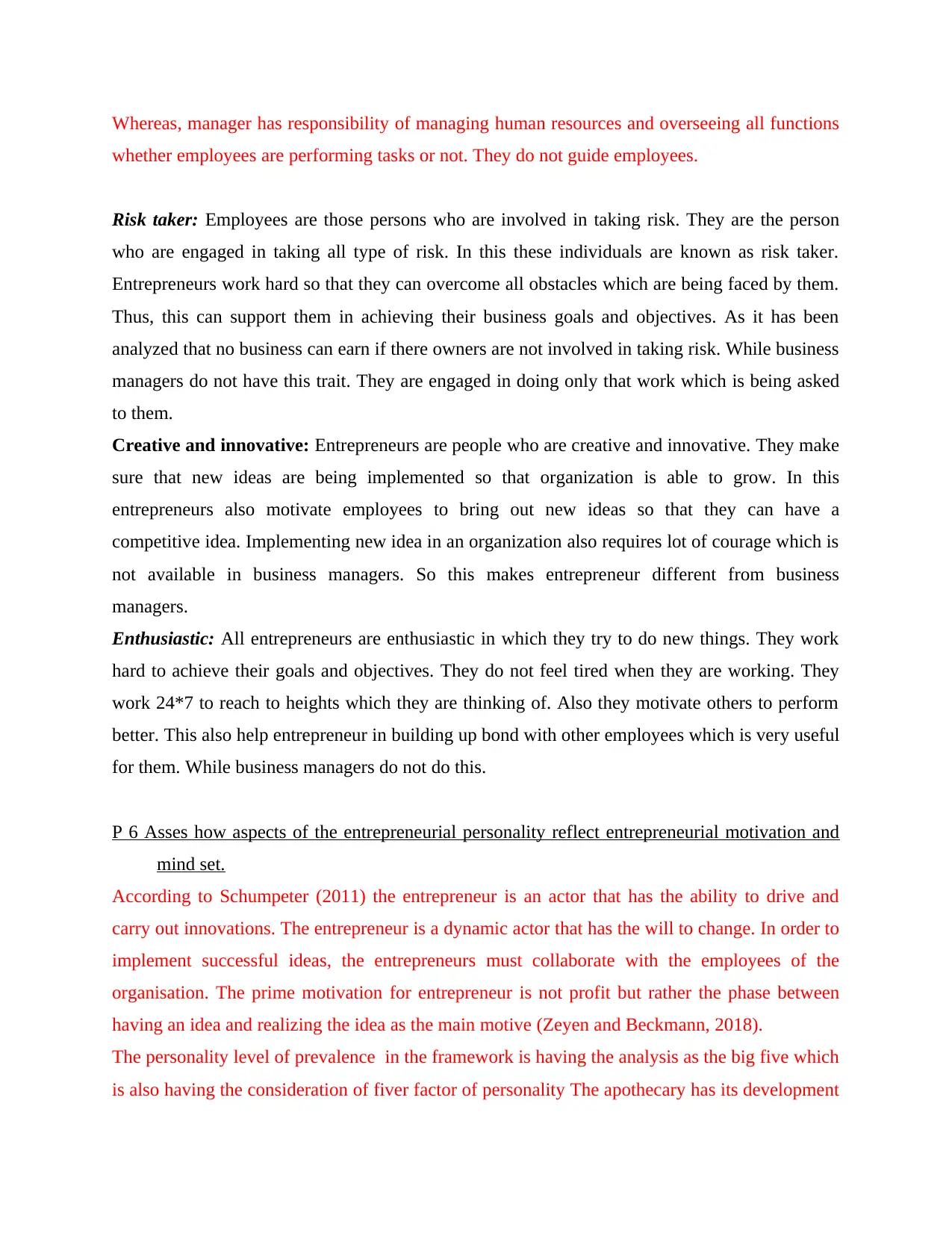
Whereas, manager has responsibility of managing human resources and overseeing all functions
whether employees are performing tasks or not. They do not guide employees.
Risk taker: Employees are those persons who are involved in taking risk. They are the person
who are engaged in taking all type of risk. In this these individuals are known as risk taker.
Entrepreneurs work hard so that they can overcome all obstacles which are being faced by them.
Thus, this can support them in achieving their business goals and objectives. As it has been
analyzed that no business can earn if there owners are not involved in taking risk. While business
managers do not have this trait. They are engaged in doing only that work which is being asked
to them.
Creative and innovative: Entrepreneurs are people who are creative and innovative. They make
sure that new ideas are being implemented so that organization is able to grow. In this
entrepreneurs also motivate employees to bring out new ideas so that they can have a
competitive idea. Implementing new idea in an organization also requires lot of courage which is
not available in business managers. So this makes entrepreneur different from business
managers.
Enthusiastic: All entrepreneurs are enthusiastic in which they try to do new things. They work
hard to achieve their goals and objectives. They do not feel tired when they are working. They
work 24*7 to reach to heights which they are thinking of. Also they motivate others to perform
better. This also help entrepreneur in building up bond with other employees which is very useful
for them. While business managers do not do this.
P 6 Asses how aspects of the entrepreneurial personality reflect entrepreneurial motivation and
mind set.
According to Schumpeter (2011) the entrepreneur is an actor that has the ability to drive and
carry out innovations. The entrepreneur is a dynamic actor that has the will to change. In order to
implement successful ideas, the entrepreneurs must collaborate with the employees of the
organisation. The prime motivation for entrepreneur is not profit but rather the phase between
having an idea and realizing the idea as the main motive (Zeyen and Beckmann, 2018).
The personality level of prevalence in the framework is having the analysis as the big five which
is also having the consideration of fiver factor of personality The apothecary has its development
whether employees are performing tasks or not. They do not guide employees.
Risk taker: Employees are those persons who are involved in taking risk. They are the person
who are engaged in taking all type of risk. In this these individuals are known as risk taker.
Entrepreneurs work hard so that they can overcome all obstacles which are being faced by them.
Thus, this can support them in achieving their business goals and objectives. As it has been
analyzed that no business can earn if there owners are not involved in taking risk. While business
managers do not have this trait. They are engaged in doing only that work which is being asked
to them.
Creative and innovative: Entrepreneurs are people who are creative and innovative. They make
sure that new ideas are being implemented so that organization is able to grow. In this
entrepreneurs also motivate employees to bring out new ideas so that they can have a
competitive idea. Implementing new idea in an organization also requires lot of courage which is
not available in business managers. So this makes entrepreneur different from business
managers.
Enthusiastic: All entrepreneurs are enthusiastic in which they try to do new things. They work
hard to achieve their goals and objectives. They do not feel tired when they are working. They
work 24*7 to reach to heights which they are thinking of. Also they motivate others to perform
better. This also help entrepreneur in building up bond with other employees which is very useful
for them. While business managers do not do this.
P 6 Asses how aspects of the entrepreneurial personality reflect entrepreneurial motivation and
mind set.
According to Schumpeter (2011) the entrepreneur is an actor that has the ability to drive and
carry out innovations. The entrepreneur is a dynamic actor that has the will to change. In order to
implement successful ideas, the entrepreneurs must collaborate with the employees of the
organisation. The prime motivation for entrepreneur is not profit but rather the phase between
having an idea and realizing the idea as the main motive (Zeyen and Beckmann, 2018).
The personality level of prevalence in the framework is having the analysis as the big five which
is also having the consideration of fiver factor of personality The apothecary has its development
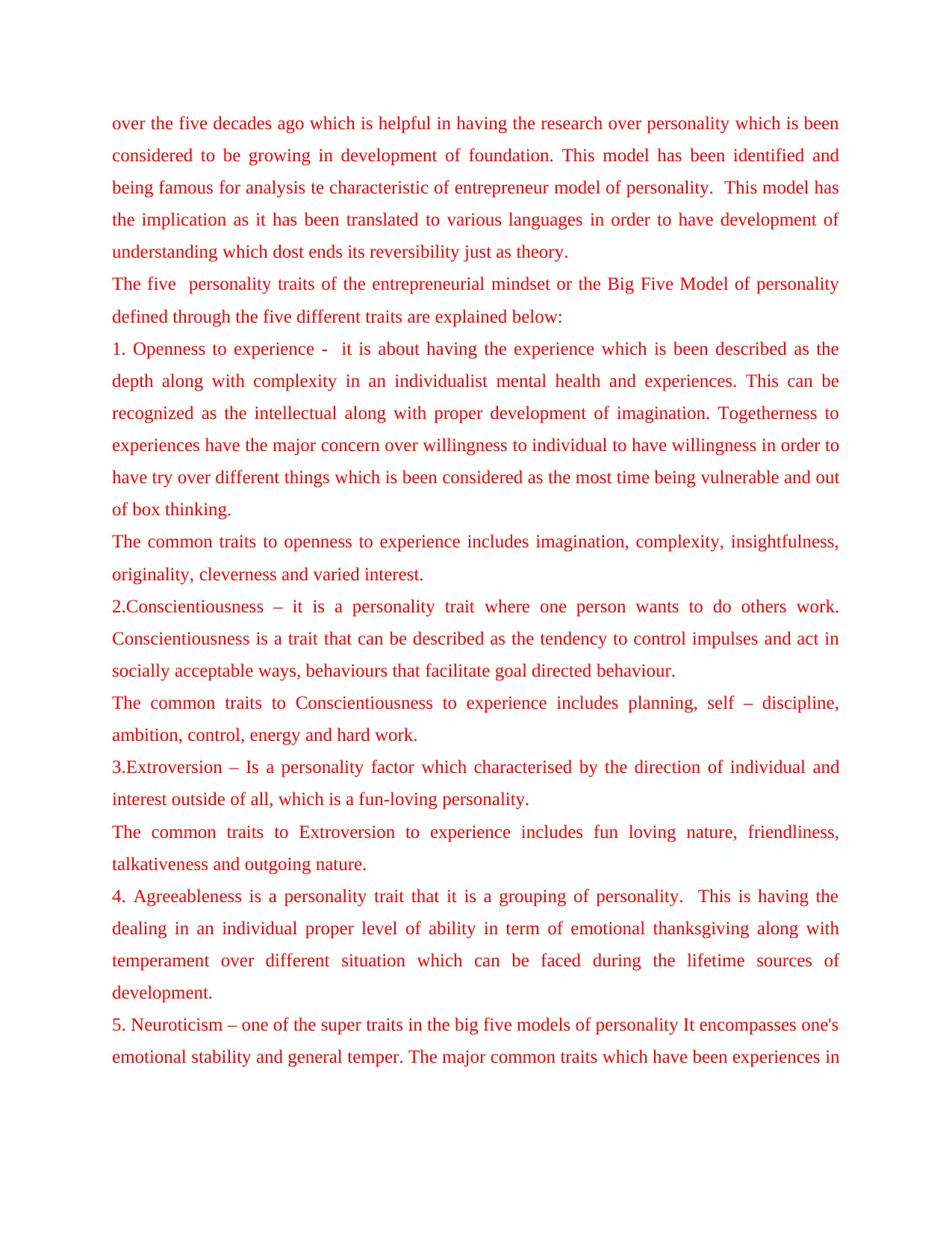
over the five decades ago which is helpful in having the research over personality which is been
considered to be growing in development of foundation. This model has been identified and
being famous for analysis te characteristic of entrepreneur model of personality. This model has
the implication as it has been translated to various languages in order to have development of
understanding which dost ends its reversibility just as theory.
The five personality traits of the entrepreneurial mindset or the Big Five Model of personality
defined through the five different traits are explained below:
1. Openness to experience - it is about having the experience which is been described as the
depth along with complexity in an individualist mental health and experiences. This can be
recognized as the intellectual along with proper development of imagination. Togetherness to
experiences have the major concern over willingness to individual to have willingness in order to
have try over different things which is been considered as the most time being vulnerable and out
of box thinking.
The common traits to openness to experience includes imagination, complexity, insightfulness,
originality, cleverness and varied interest.
2.Conscientiousness – it is a personality trait where one person wants to do others work.
Conscientiousness is a trait that can be described as the tendency to control impulses and act in
socially acceptable ways, behaviours that facilitate goal directed behaviour.
The common traits to Conscientiousness to experience includes planning, self – discipline,
ambition, control, energy and hard work.
3.Extroversion – Is a personality factor which characterised by the direction of individual and
interest outside of all, which is a fun-loving personality.
The common traits to Extroversion to experience includes fun loving nature, friendliness,
talkativeness and outgoing nature.
4. Agreeableness is a personality trait that it is a grouping of personality. This is having the
dealing in an individual proper level of ability in term of emotional thanksgiving along with
temperament over different situation which can be faced during the lifetime sources of
development.
5. Neuroticism – one of the super traits in the big five models of personality It encompasses one's
emotional stability and general temper. The major common traits which have been experiences in
considered to be growing in development of foundation. This model has been identified and
being famous for analysis te characteristic of entrepreneur model of personality. This model has
the implication as it has been translated to various languages in order to have development of
understanding which dost ends its reversibility just as theory.
The five personality traits of the entrepreneurial mindset or the Big Five Model of personality
defined through the five different traits are explained below:
1. Openness to experience - it is about having the experience which is been described as the
depth along with complexity in an individualist mental health and experiences. This can be
recognized as the intellectual along with proper development of imagination. Togetherness to
experiences have the major concern over willingness to individual to have willingness in order to
have try over different things which is been considered as the most time being vulnerable and out
of box thinking.
The common traits to openness to experience includes imagination, complexity, insightfulness,
originality, cleverness and varied interest.
2.Conscientiousness – it is a personality trait where one person wants to do others work.
Conscientiousness is a trait that can be described as the tendency to control impulses and act in
socially acceptable ways, behaviours that facilitate goal directed behaviour.
The common traits to Conscientiousness to experience includes planning, self – discipline,
ambition, control, energy and hard work.
3.Extroversion – Is a personality factor which characterised by the direction of individual and
interest outside of all, which is a fun-loving personality.
The common traits to Extroversion to experience includes fun loving nature, friendliness,
talkativeness and outgoing nature.
4. Agreeableness is a personality trait that it is a grouping of personality. This is having the
dealing in an individual proper level of ability in term of emotional thanksgiving along with
temperament over different situation which can be faced during the lifetime sources of
development.
5. Neuroticism – one of the super traits in the big five models of personality It encompasses one's
emotional stability and general temper. The major common traits which have been experiences in
⊘ This is a preview!⊘
Do you want full access?
Subscribe today to unlock all pages.

Trusted by 1+ million students worldwide
1 out of 17
Related Documents
Your All-in-One AI-Powered Toolkit for Academic Success.
+13062052269
info@desklib.com
Available 24*7 on WhatsApp / Email
![[object Object]](/_next/static/media/star-bottom.7253800d.svg)
Unlock your academic potential
Copyright © 2020–2026 A2Z Services. All Rights Reserved. Developed and managed by ZUCOL.





